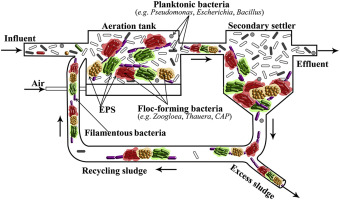
Newsroom
Comparative Genomics and Molecular Genetics Studies Reveal Genes Required for Floc Formation of Activated Sludge Bacteria
A Chinese team led by Dr. QIU Dongru, professor of Institute of Hydrobiology, Chinese Academy of Sciences (IHB) and Dr. Tong Zhang, associate professor of University of Hong Kong, has worked on the isolated Zoogloea strains, the predominant floc-forming bacteria in the activated sludge treating municipal sewage. They reported the comparative genomics analyses on two floc forming Z. resiniphila strains, MMB and TS9, isolated from the AS flocs of municipal sewage treatment plants of Wuhan and Hong Kong, respectively.
By using molecular genetics and chemical approaches, the graduate students Mr. AN Weixin, Ms. GAO Na and others identified a large extracellular polysaccharide biosynthesis gene cluster required for floc formation and also characterized the glycosyl composition of Z. resiniphila MMB strain. Interestingly, two asparagine synthase genes have also been found to be involved in floc formation. Interspecific and intraspecific variations among this gene cluster are revealed.
The analyses on the EPS biosynthesis genes across the bacterial genomes indicate that many AS bacteria, including the yet-uncultured polyphosphate-accumulating Candidatus Accumulibacter phosphatis (CAP) strains, harbor similar EPS biosynthesis genes. These findings account for some previous observations on As and indicate that many of key AS bacteria are also capable of floc formation.
The research findings have recently been published on-line ahead of print by the prestigious journal Water Research of International Water Association (DOI: 10.1016/j.watres.2016.06.058) with the title of “Comparative genomics analyses on EPS biosynthesis genes required for floc formation of Zoogloea resiniphila and other activated sludge bacteria”. This work was supported by the Chinese Academy of Science Grant Y15103-1-401, KP2015A09, and One-Hundred Scholar Award to QIU Dongru, and Hong Kong General Research Funds (HKU17209914) to Tong Zhang. Other colleagues including Dr. GUO Feng of Xiamen University and Dr. CHEN Haofeng of Institute of Genetics and Developmental Biology, Chinese Academy of Sciences also participate in this study.
 |
|
Figure 1Conceptual abstract showing that floc-forming bacteria such asZoogloea,Thaueraand CAP strains could be enriched in activated sludge process while planktonic cells of bacteria could be readily washed away along with the effluents. (Figure by IHB) |